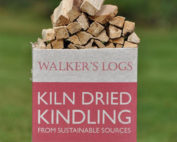
Fuel and logs

Good quality fuel will always produce better results than poor, wet wood. Dry hardwood logs are best, providing the most heat by volume. For more information on the best sustainable fuel, visit www.walkerslogs.co.uk and contact them to discuss your fuel requirements.
In the past, stoves contributed to air pollution but now with a new clean generation of stoves we can at least make a contribution towards cleaner air and energy conservation by burning wood in a highly efficient stove.
WOOD
Fuel with a future
When trees grow they absorb carbon dioxide and generate oxygen that is essential for our planet’s survival. Whether wood is burned as fuel or left to decay in the forest, it will release the same amount of carbon dioxide into the atmosphere.
Surely no one can doubt that the most perfect energy source that could ever be conceived is one that self plants, provides food and shelter throughout its life and, when mature, provides timber. Waste products can be burned to provide warmth and flame; during its life it will have provided twenty times more oxygen than is required for combustion, which in turn releases no more CO2 than would eventual decay.
To ensure that we have healthy trees we must have serious wood management and careful harvesting. Healthy trees absorb three times as much CO2 than will be released during combustion.
Supplement your heating
A forest is a huge battery of stored solar energy. Large areas of low-grade land are ideally suited to forestation. Forests are able to absorb much of the Earth’s CO2 imbalance reducing global warming. Organised forestation can moderate our need to burn precious reserves of oil and gas, conserving them for more valuable uses, limiting oil spills and minimising our need for increased nuclear power.
Supplementing your heating with an efficient woodburning stove is a huge step towards energy independence.




